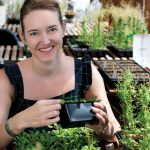Professor Ronald Evans, first author and former Staff Scientist Eiji Yoshihara, and colleagues have made a major advance in the pursuit of a safe and effective treatment for type 1 diabetes. Using stem-cell technology, they generated the first human insulin-producing pancreatic cell clusters able to evade the immune system. These “immune shielded” cell clusters controlled blood glucose without immunosuppressive drugs in mice, once transplanted in the body.
Metabolism
IN THIS ISSUE
Genes & Development
09/2020
Common diabetes drug reverses inflammation in the liver
The diabetes drug metformin has been prescribed to hundreds of millions of people worldwide as the frontline treatment for type 2 diabetes. Now, Professor Reuben Shaw, first author Jeanine Van Nostrand and colleagues have shown the importance of specific enzymes in the body for metformin’s function. In addition, the new work showed that the same proteins, regulated by metformin, controlled aspects of inflammation in mice, something the drug has not typically been prescribed for. Apart from clarifying how metformin works, the research has relevance for many other inflammatory diseases.
Read News ReleaseFeatured Stories
 Leading Salk science into the futureInside Salk sat down with Rusty Gage to learn more about his background, approach to managing a world-renowned Institute, and vision for Salk science over the next decade.
Leading Salk science into the futureInside Salk sat down with Rusty Gage to learn more about his background, approach to managing a world-renowned Institute, and vision for Salk science over the next decade. Julie Law – Revealing RNAAssociate Professor Julie Law shares common themes underlying her research and discusses what motivates her both in and out of the lab.
Julie Law – Revealing RNAAssociate Professor Julie Law shares common themes underlying her research and discusses what motivates her both in and out of the lab.
 Gerald Pao – Pushing the limits in science and lifeFrom studying the novel coronavirus to downloading brains to computers, Staff Scientist Gerald Pao is at the forefront of scientific advancement.
Gerald Pao – Pushing the limits in science and lifeFrom studying the novel coronavirus to downloading brains to computers, Staff Scientist Gerald Pao is at the forefront of scientific advancement. Austin ColeyAustin Coley, though only at Salk since 2019, has already taken an active role in everything from conducting innovative research on the brain to spearheading a wide variety of outreach activities.
Austin ColeyAustin Coley, though only at Salk since 2019, has already taken an active role in everything from conducting innovative research on the brain to spearheading a wide variety of outreach activities. Salk’s Harnessing Plants Initiative (HPI) Garners Widespread SupportNew grants are supporting the Institute’s efforts to optimize plants’ natural ability to store carbon and mitigate climate change. This support bolsters the ongoing HPI project focused on model plants that was funded through donations to The Audacious Project in 2019.
Salk’s Harnessing Plants Initiative (HPI) Garners Widespread SupportNew grants are supporting the Institute’s efforts to optimize plants’ natural ability to store carbon and mitigate climate change. This support bolsters the ongoing HPI project focused on model plants that was funded through donations to The Audacious Project in 2019.






















































